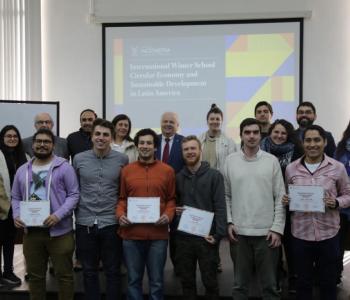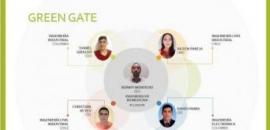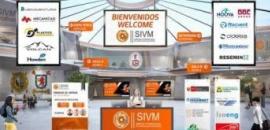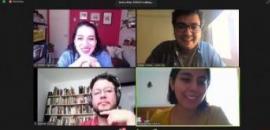You are here
First Version of the International School on Sustainable Development and Circular Economy is Successfully Completed

August 8, 2019
This program was developed during two weeks with a total of 90 hours of lectures. Students expanded on the problems about the main aspects of sustainable development and circular economy, considering the opening of the COP25 summit for next December.
Seminars, workshops and field trips were the activities carried out by students from Brazil, New Zealand and Germany, as well as students from the Universidad de Concepción and the Universidad de Santiago de Chile, within the context of the First School of Sustainable Development and Circular Economy. The school was supported by the Vice deanery of Outreach, Social Engagement and International Affairs together with the Sub-directorate of International Relations of the Faculty of Engineering and the Departments of Chemical, Electrical, Geographical and Industrial Engineering.
About the success of the school, the Dean of the Faculty of Engineering, Juan Carlos Espinoza, notes that this "is an important step for the internationalization of the faculty and the university in terms of having international students in a program of exclusive dedication. The school provides not only the knowledge about the idiosyncrasy of our university and faculty, but also exposes the real problems of the region about sustainability and circular economy”.
The First International School had four main modules about pollution, energy, sustainable development, and circular economy and interculturality. These sought to promote critical thinking on students about the impacts of engineering development in a local, social and interdisciplinary context. This version had the participation of academics from the university, representatives of the Ministry of Environment, Fundación Basura, Fundación Chilenter and StartUp TriCiclos.
The Director of the school, PhD René Garrido, made a positive assessment of the outcomes. “We could create a space for discussion in topics related with sustainable development and circular economy and discuss about the updated topics about that. This helped a lot to the development and the understanding of how things are going and, most important, the multidisciplinary team building we achieved. We generated a space where it was possible to appreciate and support the other, and to work together. So it is necessary to understand that multidiscipline is only generated when we have enough space available to develop.”
Oscar Mahy, student of the Technological University of Auckland, New Zealand, and participant of this first version, assures that the most important thing he learned was that problems are not only based on technological issues, "but also have a much more social dimension based on the economy. The good thing was to have a Chilean perspective; that allowed me to have a wider global vision. Thanks to this school I will be able to bring all my knowledge to my country to try to solve real-life problems”.
The activities also included trips outside the campus that included visits to the Museo de la Memoria Derechos Humanos (Museum of Memory and Human Rights, the Moneda Palace, La Farfana Sewage Treatment Plant, the “Punto Limpio” (waste facility for recycling) of the Parque de los Reyes, the Fundación Chilenter, Greenlibros, and the Viña Odfjell. These activities are meant to expand the learning experience.
The director also emphasizes the willingness to carry out the second version on the same content in a summer school format. "I feel that this version was a good precedent and I hope that a second version could be developed with the same success or more", he concluded.
Translated by Alexandra Cabrera



